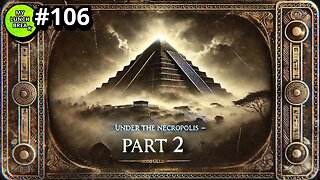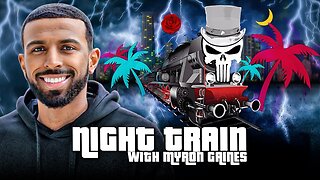Premium Only Content

Animal Sounds in English: How to Make Sounds Like Cats, Dogs and More
1. Cats: meow
As any cat owner knows, cats meow when they want something. When they’re content (happy)—like when you pet them—they purr. Cat purring sounds like a little engine!
Unhappy cats might yowl, or cry out loudly. Or they might hiss, which is also the sound a snake makes.
2. Dogs: woof
Dogs make many noises, depending on what they’re feeling and even how big they are.
Angry dogs growl, scared dogs whimper, and some dogs (and wolves) howl.
Many dogs woof or ruff, but small dogs yip and yap (someone yappy is someone who talks a lot), while large dogs have a deep bow-wow.
All these sounds are called barking. A dog that says “woof” is not “woofing,” it’s barking.
3. Horses: neigh
If you’ve ever heard a horse’s sound, you know it’s hard to describe. In English the sound is written as a neigh, and is called a whinny.
The word “whinny” might be another attempt to write the sound a horse makes, or might be related to the word “whine,” which is a complaining sound. It can also be used to talk about humans who are complaining a lot.
Horses also make a snorting sound and the less often used nicker, which is a low whinny.
4. Goats and sheep: baa
A classic nursery song mentions the sounds of goats and sheep: “Baa baa black sheep have you any wool?”
These farm animals make the sound baa, which is unusual because we don’t normally see two a’s next to each other in English. The double a’s are used to show that the sound is elongated (lengthened). This cry is called a bleat.
5. Pigs: oink
In English, pigs say oink.
Pigs also squeal, which is a high-pitched whine. Humans also squeal to show happiness (i.e. “She squealed in delight when she saw the present”).
“To squeal on someone” also means telling on them, especially concerning a crime. For example, “The robber would have gotten away with the money, but his partner squealed to the police.”
Another pig noise is the grunt.
You probably grunt sometimes too, since it’s the sound you make when you do something physically difficult. A grunt is also the name for the lowest level workers and soldiers.
This led to the term “grunt work,” used to describe boring jobs that no one wants to do. We seem to take a lot of inspiration from pigs!
6. Cows: moo
The sound a cow makes is moo. This sound is officially called lowing, which comes from a word that means to shout, but you’ll probably never hear it called that in real life.
Saying that “the cow is mooing” is just fine!
7. Donkeys: hee-haw
Donkeys have a two-toned call that sounds pretty funny. In English, this sound is called braying, and is written as hee-haw.
The British version is a bit different from the American though; it’s written as eeyore. Sound familiar? That’s the name of the sad donkey in the Winnie the Pooh stories.
8. Chickens: cluck
Female chickens are called hens and they make a clucking sound. Baby chickens say cheep, and are called chicks, which is also an extremely informal and somewhat insulting way to refer to women.
Different languages seem to agree on these sounds pretty closely, but roosters (male chickens) are a different matter!
9. Roosters: cock-a-doodle-do
When a rooster calls in the morning, that’s called crowing (similar to the bird “crow,” but in this case it’s a verb).
In English, the sound of a rooster is written as cock-a-doodle-do. How is that different from the sound a rooster makes in your language?
10. Birds: chirp
Birds of all sizes are known for their sounds, which are usually called singing. Birds chirp, trill and warble.
They also tweet and twitter, which you might recognize as the name of a very popular social media website with a bird logo. Now you know why!
11. Owls: hoot
Owls might be birds, but they make different sounds. In fact, they’re known for not using too many sounds at all as they fly; they’re silent predators (animals that hunt other animals for food).
The owl’s sound is called a hoot. Owls, and other birds of prey like eagles and hawks, can also screech—a loud, high-pitched yell.
12. Ducks and geese: quack / honk
Do you think ducks and geese sound the same? In English, they make two very different sounds.
Ducks quack and geese honk.
Both words are also used in regular English: cars and trucks also honk when they blast their horns, and a quack is a fake doctor.
13. Turkeys: gobble
The sound a turkey makes is called a gobble. That’s also a word that means to eat quickly. So every Thanksgiving—an American holiday when people traditionally eat turkeys—we gobble up turkeys.
14. Mosquitoes: buzz
How many times have you been awakened in the middle of the night as a mosquito flew by your ear? Many insects like mosquitoes, flies and bees, make a buzzing sound.
In the middle of the night, the sound is more like a whine, which you’ve already read means to complain. We should be the ones complaining!
15. Crickets: chirp
Crickets, like birds, say chirp. Many crickets chirping together make a beautiful sound. One cricket chirping indoors can drive you crazy.
16. Frogs: ribbit
In English, frogs croak or say ribbit, and you can thank Hollywood for that!
Ribbit is the accepted sound for a frog in English, but only one frog species actually says ribbit, and it was introduced into our language by Hollywood when sounds came to the movies.
17. Lions: roar
If you’re out in the African wilderness and you hear a low growl or a loud roar, get out of there fast! That’s the sound of a lion, the “king of the jungle.”
Now you’ll always know which words to use when you’re talking about animals. These aren’t brought up as much in English classes, but they’re fun to learn.
In general, onomatopoeia is used in stories and sometimes in casual language. To expand your vocabulary, you can pick up more onomatopoeia and slang through English media, like the videos on FluentU.
They feature tons of expressive words, and you’ll learn them in context through interactive subtitles and custom quizzes.
As your vocabulary grows, you can spice up your speech and improve your writing. That’s one step closer to using English like a native!
-
 25:08
25:08
MYLUNCHBREAK CHANNEL PAGE
1 day agoUnder The Necropolis - Pt 2
161K52 -
 1:45:59
1:45:59
Spittin' Chiclets
1 day agoCanadian Chokejob - Game Notes Live From Chicago - 12.28.2024
199K29 -
 9:18
9:18
Space Ice
17 hours agoThe Guyver - Alien Bug Suits, Exploding Dragons, & Mark Hamill - Weirdest Movie Ever
96.5K22 -
 12:46
12:46
RealReaper
2 days ago $7.24 earnedMufasa is a Soulless Cash Grab
72.8K7 -
 5:14:24
5:14:24
FusedAegisTV
18 hours agoWelcome to The King of Iron Fist Tournament! \\ TEKKEN 8 Stream #1
128K1 -
 DVR
DVR
Bannons War Room
1 year agoWarRoom Live
101M -
 5:42:36
5:42:36
FreshandFit
1 day agoLive X Censorship For Opposing Immigration?!
239K117 -
 1:08:16
1:08:16
Tactical Advisor
19 hours agoNEW Budget Glocks | Vault Room Live Stream 011
123K9 -
 16:30
16:30
SNEAKO
1 day agoNO FRIENDS IN THE INDUSTRY.
159K72 -
 6:19
6:19
BlackDiamondGunsandGear
1 day agoHow Fat Guys can Appendix Carry
111K12